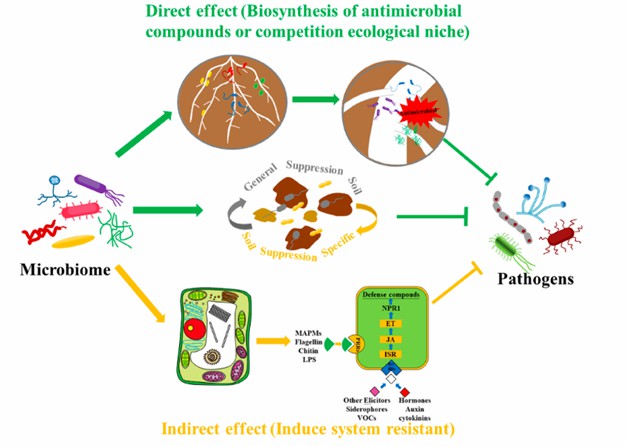Lifeasible focuses on plant protection. We value the use of microorganisms in plant protection and provide services to help plant protection-related microorganism research.
In plant protection, using agrochemicals has led to the emergence of resistant pathogens and environmental damage. There is an urgent need to open new environmentally friendly means of plant protection to protect plants. Using microorganisms for plant protection is an environmentally friendly approach to plant protection. Microbial protection of plants includes direct protection and indirect protection. Microorganisms protect plants directly by competing for the growth space and nutrients of pathogenic microorganisms and by secreting anti-microbial substances. Microorganisms protect plants indirectly by enhancing nutrient supply, secreting plant growth hormones, and regulating plant immune responses. In general, the application of microorganisms to plant protection has considerable potential.
 Fig. 1 Illustration of the different ways in which the microbiome enhances plant resistance to diseases (Qu et al., 2020).
Fig. 1 Illustration of the different ways in which the microbiome enhances plant resistance to diseases (Qu et al., 2020).
Lifeasible provides research services related to the application of microorganisms in plant protection. We currently provide four main types of services to support research on microorganisms in plant protection.
Study of plant endophytes in plant protection
Plant endophytes exist in almost all plants. They are harmless to the host plant and play an active role in protecting the host plant by secreting phytohormones, improving nutrition, and resisting pathogens. We provide endophyte detection and differential analysis service, endophyte protection function research service, and endophyte isolation and culture service to help study the role of endophytes in plant protection.
Study of rhizosphere microorganisms in plant protection
Rhizosphere microorganisms are important microorganisms that support plant growth and have a protective effect on plants. Rhizosphere microorganisms have complex interactions with plants. We help study the interactions and interaction mechanisms between them and help design the rhizosphere microbiome for plant protection applications.
Study of lipopeptide-producing microorganisms in plant protection
Lipopeptide-producing microorganisms are of great value in plant protection. Lipopeptides have been found to have anti-fungal, anti-viral, anti-insect, and plant immunomodulatory activities. We provide one-stop research services for lipopeptide-producing microorganisms, including screening of lipopeptide-producing microorganisms, identifying lipopeptides, studying the plant protection mechanism of lipopeptides, and optimizing lipopeptides.
Plant-beneficial microorganism-pathogen interactions
We offer services to help explore the specific mechanisms of plant-beneficial microorganism-pathogen interactions to help decipher the theoretical basis for beneficial plant-microorganism partnerships. We help study plant-beneficial microorganism interactions, beneficial microorganism-plant pathogen interactions, and the interactions between all three.
In-depth knowledge of plant protection
We have a professional background in plant protection and a long-term focus on plant protection-related research. We can quickly discover microorganisms' role in plant protection and research protection mechanisms.
Customized service
The role of microorganisms in plant protection is diverse. We provide research services to solve microorganism research problems in plant protection on a one-to-one basis according to the specific situation.
Integrated analysis
We do not only provide analysis of endophytes, lipopeptide-producing microorganisms, and rhizosphere microorganisms individually in plant protection. We can also provide integrated plant protection analysis of endophytes, lipopeptide-producing microorganisms, rhizosphere microorganisms, and other beneficial microorganisms. We can provide a more comprehensive explanation of the role of microorganisms in plant protection and provide recommendations for their application.
Beneficial microorganisms play their roles in plant protection and provide directions for applying microorganisms. Lifeasible provides focused research services for beneficial microorganisms to facilitate the application of microorganisms in plant protection. We focus on plant protection and welcome you to contact us for plant protection-related research services on beneficial microorganisms.
References